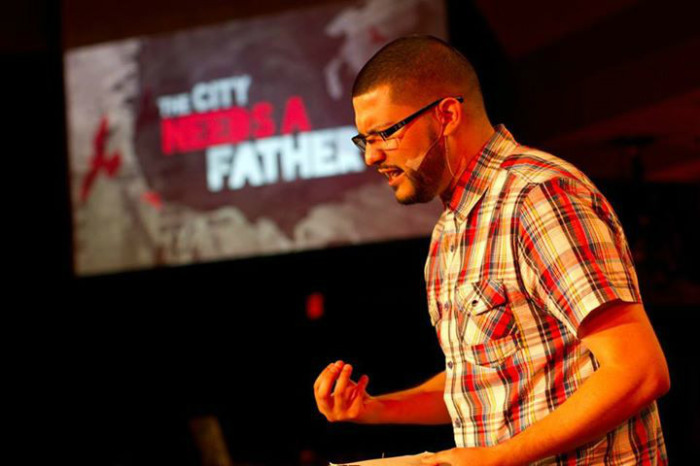How Christians Can Leverage #BlackLivesMatter and Have a Seat at the Table
'The Church Has the Answer to Systemic Racism and It Is the Gospel of Jesus Christ,' D.A. Horton Says
NEW YORK — A Christian apologist with Mexican and Native American roots, who was raised in predominantly black neighborhoods, has advice for believers who take issue with the phrase "black lives matter" — three words representative of a years-long movement drawing attention to biased policing and systemic issues affecting African-Americans.

Minister D.A. Horton, an author, church planter and urban apologist completing his Ph.D. studies at Southeastern Baptist Theological Seminary, knows first-hand what it is to be marginalized, tokenized and victimized as the member of a minority community.
He has a heart for urban ministry, particularly for urban youth, and is often tapped to speak on matters related to race and indigenous Christian leadership.
Horton was among panelists who discussed "The State of Racial Reconciliation in America: Ferguson, Eric Gardner, and Your Community" at the SBC's Ethics & Religious Liberty Commission's conference earlier this year. He also recently wrote about encountering resistance among Evangelicals to be moved by the assertion, based on biblical evidence, he says, that inside the human race "is multitude of ethnicities God created out of His genius for His glory."
The Christian Post recently spoke with Horton about his thoughts on why he believes Christians should engage the Black Lives Matter movement and not freak out when the hashtag appears on their Twitter timeline.
The transcript below has been edited for clarity.
CP: Do you think the Church is very visible, or are Christians represented very much, in the Black Lives Matter movement?
Horton: I was asked a very similar question on a panel, and I referenced the article written by Anthony Bradley of Kings College. It's the reality of answering the question why do black lives matter [that] is an issue.
The panel that I talked about, I still stand firm with the answer I gave, [which] is that we have to answer why they matter. And then ... you have to look at the systemic oppression that has been put on a people since before our nation's history began. The first slaves that arrived in Jamestown, they weren't just hopping a trip on a boat saying, "Hey, let's go vacay." They were forced here. They weren't indentured servants.
So you look at that systemic reality, you look at even the slavery, but post-slavery with Jim Crow, the cultural issues. I tell people there's been an organized systemic attack on black people, in addition to other minorities, but particularly the African-American reality because they were shipped over here. Like me being Mexican, our country was stolen from us. The Native American as well in me, it was stolen from us.
When we say #BlackLivesMatter... (words from @da_horton) pic.twitter.com/RE8uOjPyS1
— Alex Medina (@mrmedina) April 13, 2015But it's the reality of yes, all lives do matter. We recognize that because everybody is an image-bearer of God, every human equally is a marred image-bearer of God because of sin. However, in our country's narrative and history, you have seen, and it would be foolish to say there has not been a systemic attack against blacks. So affirm[ing] black lives matter by doing the hashtag, it's not affirming necessarily the lifestyle of everyone that affirms the hashtag. But I do believe that the Church has the answer to systemic racism, and it is the Gospel of Jesus Christ.
But the problem that the Church has to overcome is having a conciliation point with all the ethnicities. So when we even look at the term "racial reconciliation," in our nation's history, number one, there's never been a conciliation point for the ethnicities to come together and mobilize in unity. Not uniformity, but unity.
But that is the reality of the Church. We're a spiritual ethnicity. We're one man. There is no Jew or Gentile, but, like with Soong-Chan Rah says, even though when we appropriate Galatians 3:28 and we say there's no Jew, no Greek, no male, no female, no slave, no bondsman, we don't become asexual once we're Christian. We don't now rise three tax brackets because Jesus is our Savior, the same way that our ethnicity does not go away, it does not dissolve.
When you look at the eternal state in the city of God, it's a multiethnic reality. So God has sovereignly ordained us to be the ethnicities we are, and that needs to be celebrated, not be a cause for division. So when we look at black lives matter, Asian lives matter, Latino lives matter, all lives matter, amen.
But when we're contributing as the Church to the conversation about Black Lives Matter, we also need to be speaking up holistically how the Gospel speaks to systemic racism, the "New Jim Crow," the mass incarceration. We have to make sure that we are having a seat at the table and contributing a biblical worldview to the conversation. So we can leverage that hashtag and that conversation and that movement for the glory of God.




























